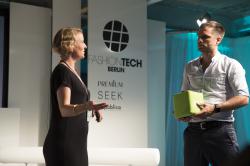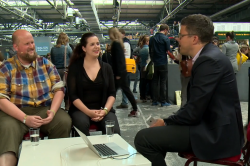j-bridle-015.jpg

James Bridle is an artist, activist and writer, and a number of other things, as he says himself. He writes about culture, literature and technology on his website booktwo.org and has published his work in WIRED, The Observer, The Atlantic and other media. This year, he will be a speaker at re:publica for the first time. In his artwork, Bridle takes a critical look at digital and technological developments. His goal is to make abstract concepts more accessible and visible, especially the systems behind our digitalized world.
With Iraq War Historiography, he published the Wikipedia entry on the Iraq War in form of a book (2009). Every tiny edit between 2004 and 2009 is documented in this twelve-volume work, including disputes on facts and differences of opinion between users regarding political positions. 7,000 pages of 12,000 edits to the Wikipedia page are the result. For Bridle, this is not just a historiographical document, but also a reminder that with the Internet, for the first time we have a system of information retrieval that documents these kinds of informational procedures, and therefore questions the way past and future narratives are established.
Something else the artist questions is the use of drones. Far from being just parcel deliverers or providers of film and photo material from a bird’s-eye perspective, these unmanned aerial vehicles are most commonly used for military purposes, and are a central part of increased surveillance. This is exactly what James Bridle wants to draw attention to. He has been running the Tumblr site Dronestragram since 2012, a blog that documents numerous military drone operations in images and presents their questionable military triumphs. Again, Bridle is making distanced, invisible technologies more visible. The activist used public space in London, Istanbul and Washington to paint to-scale models of drones on the streets. And he also coined a term for this new visibility of the invisible, for the trace of the digital in the physical world: the New Aesthetic.
In May, he will give us some more insights into his work and talk about how technology expands our geographical boundaries. We are excited!
Keynote: Living in the electromagnetic spectrum
shorttermmemoryloss.com
booktwo.org
@jamesbridle



